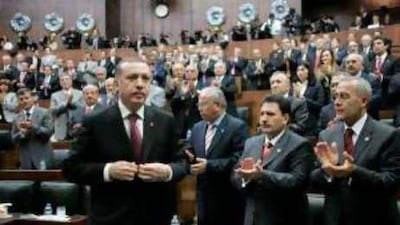ISTANBUL // Human rights activists in Turkey say they are concerned about the future of the country's democratic reforms in the face of demands by the military to widen the powers of the security forces after a deadly raid by Kurdish rebels killed 17 soldiers close to the border with Iraq.
High-ranking officers will present the proposals at a meeting of the High Council for the Fight Against Terrorism, or TMYK, tomorrow, Gen Hasan Igsiz, deputy chief of general staff, told reporters. "We think there must be a balance between security needs and human rights," the general said. The military's proposals include wider powers for security forces in the search and arrest of militant suspects, restrictions of the right of suspects to see a lawyer and the right to close off whole regions during antiterrorism operations, media reports have said.
Some newspapers compared the demands to a reintroduction of the state of emergency that was in place in the Kurdish region for many years in the 1980s and 1990s as the military fought the Kurdistan Workers' Party, or PKK. Under democratic reforms needed to join the European Union, Turkey lifted the state of emergency and introduced laws that cut back powers of security forces in recent years. New laws made it easier for people under arrest to contact a lawyer and tied some actions of the security forces, such as house searches, to permissions by a judge or a state prosecutor.
Now, this democratic progress is under threat, human rights activists said. "Measures like these would not only hurt democratic progress, they would introduce a regime of pressure," said Yavuz Onen, head of the Turkish Human Rights Foundation, a leading rights group. "We are at a difficult point. We don't know what the government will do." The TMYK comprises top officials from the government, including Recep Tayyip Erdogan, the prime minister, and key ministers as well as representatives of the military, the police force and the intelligence service. The meeting tomorrow is expected to focus on military and legal steps to be taken after PKK rebels attacked an army outpost in Aktutun in south-eastern Anatolia on Friday.
Today, parliament in Ankara is expected to extend the mandate for the military to stage forays into northern Iraq to fight the PKK. In February, Turkey sent thousands of ground troops into the neighbouring country to destroy rebel positions. Mr Erdogan, addressing parliamentary deputies of his ruling Justice and Development Party, or AKP, yesterday strongly hinted that Turkish troops would again be sent into Iraq. "The aim of a possible incursion is the terror organisation," Mr Erdogan said, referring to the PKK. "It will be done at the right time and under the necessary conditions." He said Turkey would launch a cross-border operation "if the need arises" and that military action by his country would not be directed against Iraqi civilians or the territorial integrity of the neighbouring country.
Turkish fighter jets again attacked suspected PKK positions in northern Iraq early yesterday, the general staff said on its website. The jets attacked 21 different targets before returning to their bases in Turkey. It was the fourth wave of air attacks since the PKK raid in Aktutun. A pro-government newspaper, Zaman, quoting an unnamed high-ranking official, reported yesterday that one of the measures under consideration was the erection of a "security zone" inside Iraq and the permanent deployment of Turkish soldiers near suspected rebel camps in northern Iraq. But it is the demands by the military to suspend some of the recently introduced legal and democratic reforms that have rights activists fear for their country's future.
"I think we are entering a very dangerous period," said Eren Keskin, a human rights lawyer in Istanbul and Turkey's most outspoken critic of the military. Such activists as Ms Keskin are not convinced by reassurances coming from the government. Mr Erdogan said yesterday that Turkey would "not take a single step back from democracy". But Ms Keskin said she did not think statements like these were credible. "I think the government will do what the army wants," she said. "If there is no counter movement, we are going back to the old times" of emergency rule. However, at the moment there is no sign of such a movement, she said.
Some legal observers expressed doubts about whether the security forces really need new powers to deal with the PKK. "There were similar events [like the PKK attack on the outpost in Aktutun] during the time of emergency rule," Mustafa Sentop of the law faculty at Istanbul's Marmara University told Zaman. "The problem is not in the laws. Officers have to be at the helm of their posts." Both Ms Keskin and Mr Onen said members of the security forces were making use of the public outcry against the PKK after the latest attack to push for a rollback of reforms they had never liked in the first place. "They are using these dramatic moments to create pressure in order to take back [democratic] gains," Mr Onen said. tseibert@thenational.ae

